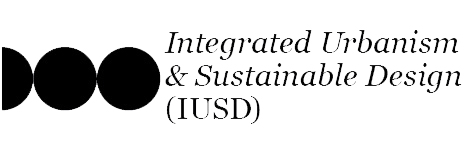
Mahmoud Noureldeen Ghoz

Mahmoud (*1995, Cairo, Egypt) received his Bachelor of Landscape Architecture from Urban Planning and Design Department, Faculty of Engineering, Ain Shams University in 2019. During his bachelor studies, Mahmoud was involved in several development and urban planning activities, he participated in the “Ezbet” Project in 2018. He also worked in child development programs and camps for 3 years. After graduation, he worked as a Site Engineer at an Architectural firm, and in parallel he started tutoring students as a part-time teaching assistant in LAAR and ENVR programs. Trying to satisfy his urge to learn, he had a desire to push ahead and invest in his education through enrolling in the IUSD programme in order to broaden his expertise and widen his knowledge in the Sustainability and Urbanism realm.
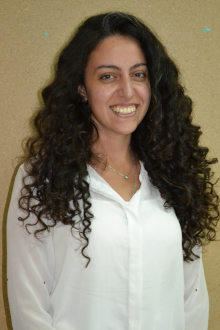
Merna Maher Thabet

Merna Maher (1995, Cairo, Egypt) studied, graduated in 2018 and then worked as a teacher assistant at the Department of Architecture, Faculty of Engineering Sciences & Arts, Misr International University. She had a semester abroad in Hochschule Luzern, University of Applied Sciences and Arts, which grew her passion about the teaching and learning process, from different Cultures and mindsets, which she also believes it’s the essence of Architecture. She took various workshops internationally and locally as an undergraduate and after the BCs degree, in Green Architecture with Europ.education, and technical office fundamentals. She freelanced as an architectural designer while she worked as a full-time teaching assistant. Then she got enthusiastic about human psychology and how Urban design can improve it on a bigger scale, So She joined the IUSD master’s program in 2020/21 to get a deeper understanding of integrated urban studies as a start for her journey.
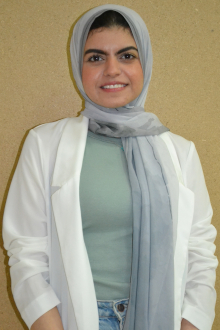
Noorhan Reda

Noorhan Reda (1996) has studied Architecture and Urban Design at the German University in Cairo. She has graduated in 2019 and worked at Megawra Built Environment and Line Designs Studio. Her experiences lie in urban design, participatory design and social practice. She always had an interest in urban design because she believes it is a study that shapes the city by connecting people and places. Her bachelor’s thesis project addressed a new interpretation of ‘Darb El Barabra – The Light District’ by rethinking the urban typologies. During her college years, while working on an urban human scale project, she participated in urban researches that focus on informal settlements of Mit Akkaba, Cairo. The design investigates the built environment, the behavior of the people and its social system; later the observation and analysis were developed into a micro urban intervention and strategic urban development for Mit Akkaba’s vision. As well as, under the title of ‘Rebranding Egyptian Cities’ with the supervision of Prof. Hussam Salama, she participated in forming the masterplan of the New Alamein City. Her motivation to join the IUSD is to experience advanced training in the field of Urban Design and contribute to a future of a resilient city.
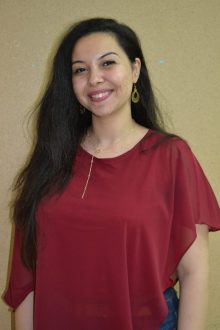
Sandy Grant

Sandy (*1996), received her bachelor’s degree from the Department of Architecture Engineering, Ain Shams University in 2019. She ranked the first of her class in the fourth year of architecture in undergraduate study and ranked the fifth as an accumulative rank for the five years in the faculty of Engineering. She was assigned as a Teaching Assistant in the same faculty. She also participated in different workshops as a mentor and lecturer including iHub summer internships. During her undergraduate years she made internships in many offices and firms including Sai solutions “Smart furniture”. She was enthusiastic about the idea of interdisciplinary solutions for real life problems, that’s why she joined the first World Design Studio (WDS’19) that was held in Clemson university, SC, USA as an architect, and that was her graduation project solving the problem of sea level rise in South Carolina through resilience in design. This interdisciplinary project, with different cultures cooperation gave her the impulse to apply for the IUSD MSc. Program.
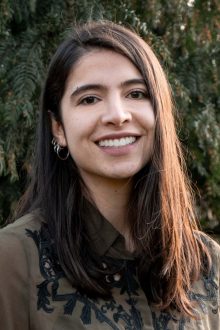
Diana Barrera

Diana was born in Manizales, Colombia, in 1992. She graduated from Architecture at Pontificia Universidad Javeriana in Bogota. Her bachelor´s thesis project addressed rural development issues; Rural Reaction was a strategy for young people to be interested in living and developing in the countryside, avoiding large migrations to the city. She is an architect with interest in interdisciplinary and participatory projects with experience in competitions, urban, architectural and landscape projects. Her work has been focussed on rural development, urban redesign, and climate adaptation. Facing the Water was the first neighbourhood in Cartagena to be adapted to climate change; Binding Traces was a strategy to rethink and to redesign two main squares and the street that connects them in La Tebaida, Colombia, and Caravane is about designing a rural artisan village built with Guadua, the Colombian bamboo. The transversal objective in her work is to empower the communities in their territory and encourage local development to improve their quality of life. That is why IUSD master programme is the key to continue her path with deeper focus on holistic urban and rural projects from a sustainable design perspective and strategies applicable in different scales -global, regional and local- and contexts -countryside and cities.
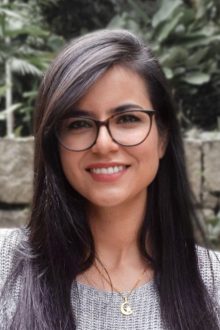
Eliana Paola Gómez Acevedo

Eliana Paola Gómez Acevedo (*1994, Bucaramanga, Colombia) graduated as an architect from Universidad Santo Tomas in 2016. Has emphasized her bachelor of science studies on Bioclimatic and quality of life. Developed her final dissertation project with a research on thermal comfort in low-income housing in Bucaramanga. By being part of multidisciplinary teams, Eliana early engaged as an architectural and urban designer in the development of projects with a strong focus on social, economic, and environmental responsibility with private and public stakeholders. In 2018 the Public Architecture Atelier of Bucaramanga (a city hall dependency) won the Karl Brunner Prize in Urban and Landscape Design in the Colombian Biennale of Architects, with Eliana being an active member of the design team. Her professional experience has also given her practical skills in the urban interior design field, and in parallel, Eliana has worked as a consultant on bioclimatic and energy efficiency in buildings.
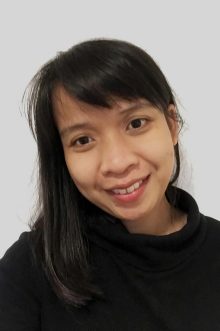
Melvina Pramadya Puspahati

Melvina Pramadya Puspahati (Jakarta, Indonesia) has graduated her bachelor’s degree in architecture from Sebelas Maret University, Solo. During her bachelor study, she did volunteer job as an architect in Jagalan Community which is a community organization in Surakarta that focusing on improving quality of abandon space at Kampung Jagalan. At the time, she did a project to enhance potential abandon space along Jagalan river into active public space for villagers, the project name was Selasar Kampung Jagalan. After graduated, she started her first job as a professional urban designer since 2012 -2017 at URBANE and 2018 -2020 at AECOM. She is consistent on her carrier path as an urban designer. She has an enthusiastic in Sustainable Urbanism because she has a vision as an urban designer to create a livable city for people and environment through design. During her working, she has joined Sustainable City & Inclusive City short course program at University of Twente, the Netherlands (2017).
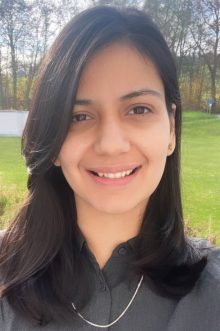
Girisha Sethi

Girisha Sethi (1994) is a graduate architect from New Delhi, India working at the intersection of architecture, research and social design. Her interests and experience lie in the phenomenology of spaces and places, vernacular architecture, participatory design and social practice.
Her graduation thesis investigated and proposed for Integrated Multi-modal Transportation in a zero-energy hub to simultaneously create a vibrant public space for the city, bringing together transportation and placemaking. Later, advocacy and collaborative planning allowed her to work with the Government of New Delhi on their initiative to redevelop the local bus terminals of the city.
She has worked in the urban realm through various players - architects, planners, researchers, government agencies and non-profit organisations in the humanitarian sector, and through contrasting approaches including both top-down and bottom-up.
Her project with the Disasters and Emergencies Preparedness Program (DEPP) Innovation Lab and the Council for Arts and Social Practice (CASP) – are two collaborations hinged in participatory planning, that shape her design approach.
Her motivation to join IUSD is to be able to decode the multi-faceted, multi-layered, complex system of systems that a city is and the mutual interdependencies of the various socio-spatial and meaning systems that make a city
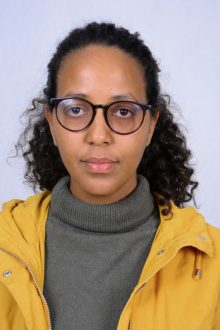
Makda Dirar Akelom

Makda graduated from Mekelle University with a BSc. Degree in Architecture in 2015, since then she has been working as an assistant lecturer in the university. During her stay, she has participated in teaching, research and community service projects, as an assistant researcher she had a chance to participate in an Erasmus+ funded research project on Social Inclusion and energy management for informal settlements. It is during this project, she started to observe the fundamental nature of urbanization, settlement and built environment in Ethiopia, in comparison to European cases. Her research trip to Eco-housing and participatory planning in the Netherlands, urban upgrading in Kassel and Inclusive Housing projects in Vienna were eye-opener experiences to study and explore different aspects of sustainable urbanization approaches and school of thought. And Through the IUSD program, she hopes to be equipped with the integrated knowledge to contribute to the future of her city and more.
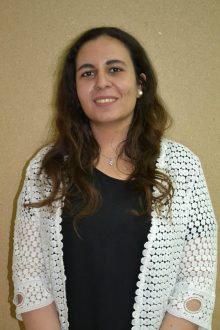
Nadine Ayman

Nadine Ayman (*1996) graduated from the department of architecture at the Faculty of Fine Arts, Helwan University in 2019. After graduation, she worked in several architecture firms and as a freelancer. Her bachelor’s thesis project “African Youth hostel and Cultural center” investigated how to create communal spaces by focusing on the user needs, youth behavior, and the psychological impact of space. During her studies besides working on different architecture and urban planning projects, she did her internship in Tataouine, Tunisia where she was introduced to participatory planning and sustainable development. Through Iusd she aims to learn a holistic approach to urban planning that ensures that projects meet the community's needs without neglecting current and future challenges
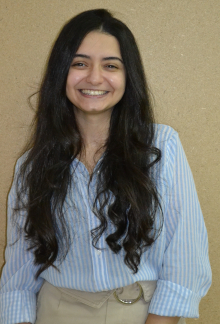
Sara Sameh

Sara (*1995, Cairo, Egypt) received her bachelor’s degree in architecture at the Faculty of Engineering, Ain Shams University in 2019. During her study, she worked as a site and technical office trainee in the Grand Egyptian Museum project in Egypt which participated extensively in her knowledge. Also, she worked on many landscape and urban design projects as a trainee in Dar Al-Handasah corporate. After then, she specialized in urban design and planning department where she found her passion in studying the urban challenges in the MENA region. After graduation, she worked as a teaching assistant in Faculty of Engineering, Ain Shams University where she developed both her knowledge and personal skills. Also, she worked as a junior architect in Spine Architects, Urban & Environmental Planners where she worked successfully on many landscape and urban projects from the early design process till the working drawings and presentation. In 2020, she worked remotely as a coordination architect in Origination Design, LLC where she successfully submitted many hotel projects and developed her knowledge with the international codes and sustainable solutions. In 2020, she enrolled in IUSD international master’s program to broaden her knowledge about the sustainable solutions for the global urban challenges.
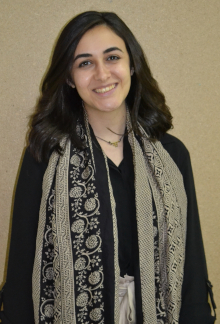
Noor Adel Sobhi

Noor (Cairo,1994) has completed her bachelor degree in Architecture in 2017. Alternating between Academia and practice, Noor worked as teaching assistant and researcher as well as a practicing architect with architecture firms in Cairo. Additionally she has worked as a content writer for Arch2O website. Her interest towards participatory planning and sustainability started after winning in an architectural design competition for Eco-Nubia ecolodge in upper Egypt . However, after working in Mumbai, India her vision was broadened and an interest grew towards learning about marginalized communities. Her fields of interest include urban sociology, heritage, history, environmental behavioral studies and visual studies. Passionate about humanitarian design and participatory approaches, her research work at the University of Stuttgart involves urban development, and economic empowerment of marginalized women.

Yara ElMaghrabi

Yara (*1994) is a Palestinian–Syrian Refugee who holds a Bachelor's degree in Architectural Engineering from Ain Shams University in Cairo, Egypt. She participated in designing a 300 Feddan Multi-Functional land in San Miguel, Mexico City, Mexico, and worked as an Intern at multiple international offices such as ECG and CLUSTER. After graduating in 2017, she worked as a Research Coordinator Assistant at IUSD where she had the chance to participate and co-coordinate a handful of workshops and excursions. She engaged in projects addressing Climate Change in ElGouna, Resilient Communities in Nuweiba, and Informal Settlements in Helwan. To expand her professional experience, she worked at architectural consulting firms including Arch-Plan and IDG. She collaborated in designing residential, commercial, educational, and administrative projects in the New Administrative Capital and the New Alamein City respectively. Since 2016, she has also been freelancing as an Architect, as a Ghostwriter, and as a Photographer for multiple companies. Her aspiration to make a difference has led her to focus her research interests on Sustainable & Resilient Disaster Relief Housing, Participatory Design, and Usage of Public Spaces.
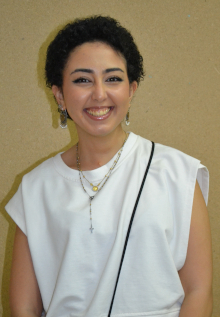
Sherry Eskarous

Sherry Eskarous (1993) graduated with her Bachelor of Science in Architectural Engineering from Misr International University (MIU) in 2017. After graduating, she started working as a Teaching Assistant at MIU, conducting design studios for different disciplines, years, and stages. She enjoys the challenges thrown at her in those design studios, keeping up to date with the news of architecture, theories, and design methods. Living in different countries ever since she was a child opened her eyes to differences in culture, behaviors, thoughts, and norms the built environment can bring. Therefore, along with her work as a TA, she is passionate about helping improve people’s life quality, no matter how small or big the actions are. She often volunteers in charity groups helping with improving the living conditions of the underprivileged. With her passion for continuous learning and gaining knowledge of integrated urbanism and how all disciplines play a key role in improving the built environment and people living in it, she joined the IUSD program. Looking forward to all the new experiences and knowledge she will gain with the aim of assisting her in her future practices.
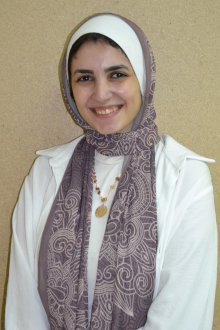
Yasmina Safwat

My name is Yasmina Safwat. I was born in Cairo, Egypt in 1995. I reflect a varied personality including ambition, determination and thoughtfulness yet the most important thing is to be passionate about what I do. Since my childhood I have been obsessed with drawing and arts in general. I believe I have had good imagination and proportion sense. Throughout my high school years, I’ve worked on developing my skills and I happened to win first place position in an art competition on the scale of all the school grades which meant a lot to me.
From this point ahead, and upon graduation from high school I was encouraged to enroll in architecture school. In 2014 I joined the landscape architecture program in Ain Shams University. Actually, the truth about architecture wasn’t as it seemed to me at all before. Throughout my studies I’ve learnt and acknowledged about a lot of dimensions and aspects that transgressed my primary previous definition. I found myself very passionate and more attracted to landscape and urban design majors. In 2019, and after achieving consistent high performance throughout my years of study, I was to be assigned as a full time teacher assistant in the urban department in Ain Shams University. Nevertheless, I chose to proceed my post-graduation studies so I enrolled in the IUSD master’s program which offers a wide range of study fields. Besides, I work as a part time engineer in one of the most significant landscape corporates in the field.
I am motivated by my passion for the continuous learning and succeeding as I am looking forward to become a remarkable woman in today’s and tomorrow’s society. Actually, I’ve always dreamt of offering my knowledge in building more civilized cities for all social classes. I aspire to contribute to a team who is passionate about helping Egypt become a pioneer in sustainable urbanism and planning one day.
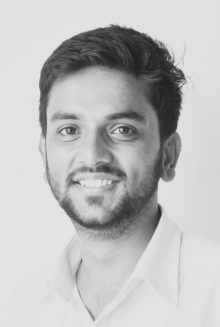
Rumman Mateen

Rumman Mateen graduated as an architect in 2017 from the Faculty of Architecture and Ekistics, Jamia Millia Islamia, New Delhi. During his studies, he took part in various design and research-based national and international competitions highlighting the issues of gender inclusion, sustainable architecture, mixed housing and urban design. His graduation thesis examined and addressed the sensitive issue of communal violence in his native city Bareilly where he designed socially inclusive congregational spaces where people from all parts of the society can live and interact in peace and progressive harmony promoting social participation and cohesion.
As part of his academic internship, he contributed in the participatory design and execution of a primary school in the village of Motidevati Gujarat, India where he got involved with multiple stakeholders and mediated between the village community and design colleagues in Stuttgart and Zurich. In cooperation with one of his university professors, he facilitated the process of constructing 'Wall of Kindness' in New Delhi to help the poor and homeless. After graduation, he joined the Indian office of the architecture and design firm 'Blocher Partners' where he worked for over three years handling various institutional and large scale hospitality projects
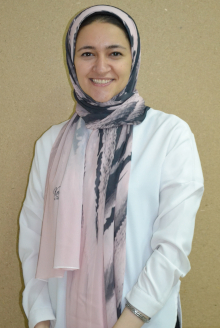
Yassmine Waheed

Yassmine (*1996, Cairo), graduated as an Architect from Ain-Shams University, Faculty of Engineering with an Excellent graduation project as WDS (World Design Studio) student. Project was held in The Peninsula, USA with a site inventory analysis trip in a team for different cultures as American and Chinese students. Believing that getting exposed to different cultures, schools and mindsets widens a person’s scope, perception, and his way of thinking. Leading urban and landscape team in graduation projects and developing sustainable strategies for the Peninsula problem that will suffer from sea level rise and be exposed to sink in 2050. That helps her a lot in developing her personality as a team leader and player, also exposing to different disciplines and growing her way of thinking. After graduation she worked as a full-time Architect in (IDG Integrated Development Group) and as part-time a teaching assistant in ASU and AAST to develop my career as an academic and a technician, believing in the importance of academic career for enriching practical work experience. She engaged in many educational projects in her technical office, Universities and schools. In 2020 she started her freelance journey in many residential projects and presentations as well. Her aspiration to make a difference has led her to complete her studies as masters’ student in IUSD (Integrated Urban and Sustainable Design), focusing on Resilient Disaster Relief as a completion for graduation project researches and chooses to have a semester exchange in Stuttgart University in Germany which is a life changing experience in her personal life and academic career.
Students 2020

Mahmoud Noureldeen Ghoz

Mahmoud (*1995, Cairo, Egypt) received his Bachelor of Landscape Architecture from Urban Planning and Design Department, Faculty of Engineering, Ain Shams University in 2019. During his bachelor studies, Mahmoud was involved in several development and urban planning activities, he participated in the “Ezbet” Project in 2018. He also worked in child development programs and camps for 3 years. After graduation, he worked as a Site Engineer at an Architectural firm, and in parallel he started tutoring students as a part-time teaching assistant in LAAR and ENVR programs. Trying to satisfy his urge to learn, he had a desire to push ahead and invest in his education through enrolling in the IUSD programme in order to broaden his expertise and widen his knowledge in the Sustainability and Urbanism realm.

Merna Maher Thabet

Merna Maher (1995, Cairo, Egypt) studied, graduated in 2018 and then worked as a teacher assistant at the Department of Architecture, Faculty of Engineering Sciences & Arts, Misr International University. She had a semester abroad in Hochschule Luzern, University of Applied Sciences and Arts, which grew her passion about the teaching and learning process, from different Cultures and mindsets, which she also believes it’s the essence of Architecture. She took various workshops internationally and locally as an undergraduate and after the BCs degree, in Green Architecture with Europ.education, and technical office fundamentals. She freelanced as an architectural designer while she worked as a full-time teaching assistant. Then she got enthusiastic about human psychology and how Urban design can improve it on a bigger scale, So She joined the IUSD master’s program in 2020/21 to get a deeper understanding of integrated urban studies as a start for her journey.

Noorhan Reda

Noorhan Reda (1996) has studied Architecture and Urban Design at the German University in Cairo. She has graduated in 2019 and worked at Megawra Built Environment and Line Designs Studio. Her experiences lie in urban design, participatory design and social practice. She always had an interest in urban design because she believes it is a study that shapes the city by connecting people and places. Her bachelor’s thesis project addressed a new interpretation of ‘Darb El Barabra – The Light District’ by rethinking the urban typologies. During her college years, while working on an urban human scale project, she participated in urban researches that focus on informal settlements of Mit Akkaba, Cairo. The design investigates the built environment, the behavior of the people and its social system; later the observation and analysis were developed into a micro urban intervention and strategic urban development for Mit Akkaba’s vision. As well as, under the title of ‘Rebranding Egyptian Cities’ with the supervision of Prof. Hussam Salama, she participated in forming the masterplan of the New Alamein City. Her motivation to join the IUSD is to experience advanced training in the field of Urban Design and contribute to a future of a resilient city.

Sandy Grant

Sandy (*1996), received her bachelor’s degree from the Department of Architecture Engineering, Ain Shams University in 2019. She ranked the first of her class in the fourth year of architecture in undergraduate study and ranked the fifth as an accumulative rank for the five years in the faculty of Engineering. She was assigned as a Teaching Assistant in the same faculty. She also participated in different workshops as a mentor and lecturer including iHub summer internships. During her undergraduate years she made internships in many offices and firms including Sai solutions “Smart furniture”. She was enthusiastic about the idea of interdisciplinary solutions for real life problems, that’s why she joined the first World Design Studio (WDS’19) that was held in Clemson university, SC, USA as an architect, and that was her graduation project solving the problem of sea level rise in South Carolina through resilience in design. This interdisciplinary project, with different cultures cooperation gave her the impulse to apply for the IUSD MSc. Program.

Diana Barrera

Diana was born in Manizales, Colombia, in 1992. She graduated from Architecture at Pontificia Universidad Javeriana in Bogota. Her bachelor´s thesis project addressed rural development issues; Rural Reaction was a strategy for young people to be interested in living and developing in the countryside, avoiding large migrations to the city. She is an architect with interest in interdisciplinary and participatory projects with experience in competitions, urban, architectural and landscape projects. Her work has been focussed on rural development, urban redesign, and climate adaptation. Facing the Water was the first neighbourhood in Cartagena to be adapted to climate change; Binding Traces was a strategy to rethink and to redesign two main squares and the street that connects them in La Tebaida, Colombia, and Caravane is about designing a rural artisan village built with Guadua, the Colombian bamboo. The transversal objective in her work is to empower the communities in their territory and encourage local development to improve their quality of life. That is why IUSD master programme is the key to continue her path with deeper focus on holistic urban and rural projects from a sustainable design perspective and strategies applicable in different scales -global, regional and local- and contexts -countryside and cities.

Eliana Paola Gómez Acevedo

Eliana Paola Gómez Acevedo (*1994, Bucaramanga, Colombia) graduated as an architect from Universidad Santo Tomas in 2016. Has emphasized her bachelor of science studies on Bioclimatic and quality of life. Developed her final dissertation project with a research on thermal comfort in low-income housing in Bucaramanga. By being part of multidisciplinary teams, Eliana early engaged as an architectural and urban designer in the development of projects with a strong focus on social, economic, and environmental responsibility with private and public stakeholders. In 2018 the Public Architecture Atelier of Bucaramanga (a city hall dependency) won the Karl Brunner Prize in Urban and Landscape Design in the Colombian Biennale of Architects, with Eliana being an active member of the design team. Her professional experience has also given her practical skills in the urban interior design field, and in parallel, Eliana has worked as a consultant on bioclimatic and energy efficiency in buildings.

Melvina Pramadya Puspahati

Melvina Pramadya Puspahati (Jakarta, Indonesia) has graduated her bachelor’s degree in architecture from Sebelas Maret University, Solo. During her bachelor study, she did volunteer job as an architect in Jagalan Community which is a community organization in Surakarta that focusing on improving quality of abandon space at Kampung Jagalan. At the time, she did a project to enhance potential abandon space along Jagalan river into active public space for villagers, the project name was Selasar Kampung Jagalan. After graduated, she started her first job as a professional urban designer since 2012 -2017 at URBANE and 2018 -2020 at AECOM. She is consistent on her carrier path as an urban designer. She has an enthusiastic in Sustainable Urbanism because she has a vision as an urban designer to create a livable city for people and environment through design. During her working, she has joined Sustainable City & Inclusive City short course program at University of Twente, the Netherlands (2017).

Girisha Sethi

Girisha Sethi (1994) is a graduate architect from New Delhi, India working at the intersection of architecture, research and social design. Her interests and experience lie in the phenomenology of spaces and places, vernacular architecture, participatory design and social practice.
Her graduation thesis investigated and proposed for Integrated Multi-modal Transportation in a zero-energy hub to simultaneously create a vibrant public space for the city, bringing together transportation and placemaking. Later, advocacy and collaborative planning allowed her to work with the Government of New Delhi on their initiative to redevelop the local bus terminals of the city.
She has worked in the urban realm through various players - architects, planners, researchers, government agencies and non-profit organisations in the humanitarian sector, and through contrasting approaches including both top-down and bottom-up.
Her project with the Disasters and Emergencies Preparedness Program (DEPP) Innovation Lab and the Council for Arts and Social Practice (CASP) – are two collaborations hinged in participatory planning, that shape her design approach.
Her motivation to join IUSD is to be able to decode the multi-faceted, multi-layered, complex system of systems that a city is and the mutual interdependencies of the various socio-spatial and meaning systems that make a city

Makda Dirar Akelom

Makda graduated from Mekelle University with a BSc. Degree in Architecture in 2015, since then she has been working as an assistant lecturer in the university. During her stay, she has participated in teaching, research and community service projects, as an assistant researcher she had a chance to participate in an Erasmus+ funded research project on Social Inclusion and energy management for informal settlements. It is during this project, she started to observe the fundamental nature of urbanization, settlement and built environment in Ethiopia, in comparison to European cases. Her research trip to Eco-housing and participatory planning in the Netherlands, urban upgrading in Kassel and Inclusive Housing projects in Vienna were eye-opener experiences to study and explore different aspects of sustainable urbanization approaches and school of thought. And Through the IUSD program, she hopes to be equipped with the integrated knowledge to contribute to the future of her city and more.

Nadine Ayman

Nadine Ayman (*1996) graduated from the department of architecture at the Faculty of Fine Arts, Helwan University in 2019. After graduation, she worked in several architecture firms and as a freelancer. Her bachelor’s thesis project “African Youth hostel and Cultural center” investigated how to create communal spaces by focusing on the user needs, youth behavior, and the psychological impact of space. During her studies besides working on different architecture and urban planning projects, she did her internship in Tataouine, Tunisia where she was introduced to participatory planning and sustainable development. Through Iusd she aims to learn a holistic approach to urban planning that ensures that projects meet the community's needs without neglecting current and future challenges

Sara Sameh

Sara (*1995, Cairo, Egypt) received her bachelor’s degree in architecture at the Faculty of Engineering, Ain Shams University in 2019. During her study, she worked as a site and technical office trainee in the Grand Egyptian Museum project in Egypt which participated extensively in her knowledge. Also, she worked on many landscape and urban design projects as a trainee in Dar Al-Handasah corporate. After then, she specialized in urban design and planning department where she found her passion in studying the urban challenges in the MENA region. After graduation, she worked as a teaching assistant in Faculty of Engineering, Ain Shams University where she developed both her knowledge and personal skills. Also, she worked as a junior architect in Spine Architects, Urban & Environmental Planners where she worked successfully on many landscape and urban projects from the early design process till the working drawings and presentation. In 2020, she worked remotely as a coordination architect in Origination Design, LLC where she successfully submitted many hotel projects and developed her knowledge with the international codes and sustainable solutions. In 2020, she enrolled in IUSD international master’s program to broaden her knowledge about the sustainable solutions for the global urban challenges.

Noor Adel Sobhi

Noor (Cairo,1994) has completed her bachelor degree in Architecture in 2017. Alternating between Academia and practice, Noor worked as teaching assistant and researcher as well as a practicing architect with architecture firms in Cairo. Additionally she has worked as a content writer for Arch2O website. Her interest towards participatory planning and sustainability started after winning in an architectural design competition for Eco-Nubia ecolodge in upper Egypt . However, after working in Mumbai, India her vision was broadened and an interest grew towards learning about marginalized communities. Her fields of interest include urban sociology, heritage, history, environmental behavioral studies and visual studies. Passionate about humanitarian design and participatory approaches, her research work at the University of Stuttgart involves urban development, and economic empowerment of marginalized women.

Yara ElMaghrabi

Yara (*1994) is a Palestinian–Syrian Refugee who holds a Bachelor's degree in Architectural Engineering from Ain Shams University in Cairo, Egypt. She participated in designing a 300 Feddan Multi-Functional land in San Miguel, Mexico City, Mexico, and worked as an Intern at multiple international offices such as ECG and CLUSTER. After graduating in 2017, she worked as a Research Coordinator Assistant at IUSD where she had the chance to participate and co-coordinate a handful of workshops and excursions. She engaged in projects addressing Climate Change in ElGouna, Resilient Communities in Nuweiba, and Informal Settlements in Helwan. To expand her professional experience, she worked at architectural consulting firms including Arch-Plan and IDG. She collaborated in designing residential, commercial, educational, and administrative projects in the New Administrative Capital and the New Alamein City respectively. Since 2016, she has also been freelancing as an Architect, as a Ghostwriter, and as a Photographer for multiple companies. Her aspiration to make a difference has led her to focus her research interests on Sustainable & Resilient Disaster Relief Housing, Participatory Design, and Usage of Public Spaces.

Sherry Eskarous

Sherry Eskarous (1993) graduated with her Bachelor of Science in Architectural Engineering from Misr International University (MIU) in 2017. After graduating, she started working as a Teaching Assistant at MIU, conducting design studios for different disciplines, years, and stages. She enjoys the challenges thrown at her in those design studios, keeping up to date with the news of architecture, theories, and design methods. Living in different countries ever since she was a child opened her eyes to differences in culture, behaviors, thoughts, and norms the built environment can bring. Therefore, along with her work as a TA, she is passionate about helping improve people’s life quality, no matter how small or big the actions are. She often volunteers in charity groups helping with improving the living conditions of the underprivileged. With her passion for continuous learning and gaining knowledge of integrated urbanism and how all disciplines play a key role in improving the built environment and people living in it, she joined the IUSD program. Looking forward to all the new experiences and knowledge she will gain with the aim of assisting her in her future practices.

Yasmina Safwat

My name is Yasmina Safwat. I was born in Cairo, Egypt in 1995. I reflect a varied personality including ambition, determination and thoughtfulness yet the most important thing is to be passionate about what I do. Since my childhood I have been obsessed with drawing and arts in general. I believe I have had good imagination and proportion sense. Throughout my high school years, I’ve worked on developing my skills and I happened to win first place position in an art competition on the scale of all the school grades which meant a lot to me.
From this point ahead, and upon graduation from high school I was encouraged to enroll in architecture school. In 2014 I joined the landscape architecture program in Ain Shams University. Actually, the truth about architecture wasn’t as it seemed to me at all before. Throughout my studies I’ve learnt and acknowledged about a lot of dimensions and aspects that transgressed my primary previous definition. I found myself very passionate and more attracted to landscape and urban design majors. In 2019, and after achieving consistent high performance throughout my years of study, I was to be assigned as a full time teacher assistant in the urban department in Ain Shams University. Nevertheless, I chose to proceed my post-graduation studies so I enrolled in the IUSD master’s program which offers a wide range of study fields. Besides, I work as a part time engineer in one of the most significant landscape corporates in the field.
I am motivated by my passion for the continuous learning and succeeding as I am looking forward to become a remarkable woman in today’s and tomorrow’s society. Actually, I’ve always dreamt of offering my knowledge in building more civilized cities for all social classes. I aspire to contribute to a team who is passionate about helping Egypt become a pioneer in sustainable urbanism and planning one day.

Rumman Mateen

Rumman Mateen graduated as an architect in 2017 from the Faculty of Architecture and Ekistics, Jamia Millia Islamia, New Delhi. During his studies, he took part in various design and research-based national and international competitions highlighting the issues of gender inclusion, sustainable architecture, mixed housing and urban design. His graduation thesis examined and addressed the sensitive issue of communal violence in his native city Bareilly where he designed socially inclusive congregational spaces where people from all parts of the society can live and interact in peace and progressive harmony promoting social participation and cohesion.
As part of his academic internship, he contributed in the participatory design and execution of a primary school in the village of Motidevati Gujarat, India where he got involved with multiple stakeholders and mediated between the village community and design colleagues in Stuttgart and Zurich. In cooperation with one of his university professors, he facilitated the process of constructing 'Wall of Kindness' in New Delhi to help the poor and homeless. After graduation, he joined the Indian office of the architecture and design firm 'Blocher Partners' where he worked for over three years handling various institutional and large scale hospitality projects

Yassmine Waheed

Yassmine (*1996, Cairo), graduated as an Architect from Ain-Shams University, Faculty of Engineering with an Excellent graduation project as WDS (World Design Studio) student. Project was held in The Peninsula, USA with a site inventory analysis trip in a team for different cultures as American and Chinese students. Believing that getting exposed to different cultures, schools and mindsets widens a person’s scope, perception, and his way of thinking. Leading urban and landscape team in graduation projects and developing sustainable strategies for the Peninsula problem that will suffer from sea level rise and be exposed to sink in 2050. That helps her a lot in developing her personality as a team leader and player, also exposing to different disciplines and growing her way of thinking. After graduation she worked as a full-time Architect in (IDG Integrated Development Group) and as part-time a teaching assistant in ASU and AAST to develop my career as an academic and a technician, believing in the importance of academic career for enriching practical work experience. She engaged in many educational projects in her technical office, Universities and schools. In 2020 she started her freelance journey in many residential projects and presentations as well. Her aspiration to make a difference has led her to complete her studies as masters’ student in IUSD (Integrated Urban and Sustainable Design), focusing on Resilient Disaster Relief as a completion for graduation project researches and chooses to have a semester exchange in Stuttgart University in Germany which is a life changing experience in her personal life and academic career.
